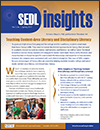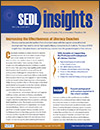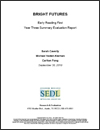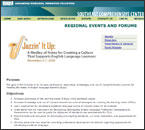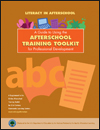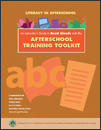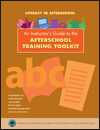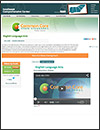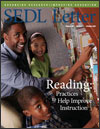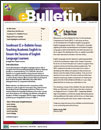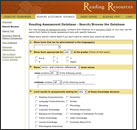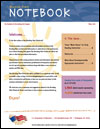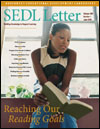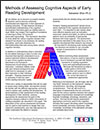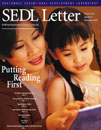SEDL's Free A-Z List of Free Resources for Reading and Literacy
Reading and Literacy
All Products in this Category
Products are listed by date published.
This issue of SEDL Insights focuses on two types of literacy that are crucial to helping students become college and career ready: content-area literacy and disciplinary literacy.
Many districts turn to literacy coaches to deliver professional development, follow-up, and support in implementing evidence-based instructional practices and programs. While literacy coaches offer an effective job-embedded professional learning mechanism for teachers, districts should also provide professional development opportunities for literacy coaches This issue of SEDL Insights how education leaders can help literacy coaches have the greatest impact at their schools.
This brief examines the critical need to implement instruction at the secondary level around adolescent, or content-area, literacy. The challenge is to connect the teaching of literacy to the rest of the secondary education improvement agenda.
Funded by the U.S. Department of Education, this 3-year project evaluated the implementation and impact of the Bright Futures Early Reading First project on outcomes for children, teachers, classrooms, and families in Madison Parish, Louisiana.
This issue of the Southeast Comprehensive Center eBulletin focuses on literacy, specifically on how states can strengthen their literacy programs or plans and provide effective professional development and technical assistance for high-need districts in their efforts to implement quality literacy instruction.
Creating a culture that supports English Language Learners (ELLs) through the use of research-based instructional strategies and targeted approaches was the focus of a regional institute held by the Southeast Comprehensive Center (SECC). The institute took place November 5–7, 2008, in New Orleans, Louisiana. The goal of this institute was to increase participants’ awareness, knowledge, and use of research-based practices for meeting the needs of ELLs.
The Afterschool Training Toolkit materials are designed to illustrate techniques and activities that leverage student curiosity to make literacy in afterschool both enjoyable and relevant. This guide provides professional development ideas for promising literacy practices in afterschool.
The National Partnership for Quality Afterschool Learning developed this instructor’s guide to accompany its Afterschool Training Toolkit, a free online staff development tool. Both the guide and the toolkit materials are designed to give afterschool instructors the resources they need to build fun, innovative, and academically enriching activities that not only engage students, but extend their knowledge in new ways and increase academic achievement.
The six promising practices in student achievement in literacy identified in the Afterschool Training Toolkit are as follows: Book Discussion Groups and Literature Circles; Read Aloud; Story and Literature Dramatizations; Writing; Family Literacy Events; One-on-One and Small-Group Tutoring. When used with the Afterschool Training Toolkit, the lessons in this instructor’s guide will help you master these promising practices. Once you become proficient at these practices, you should be able to use them to develop other literacy lessons.
Sub-category: Early Reading
The Common Core State Standards (CCSS) videos are designed to support states, schools, and teachers in the implementation of the CCSS. Each video is an audiovisual resource that focuses on one or more specific standards and usually includes examples and illustrations geared to enhancing understanding.
This K–5 supplemental instructional program provides lessons and resources that integrate math, science, and technology while supporting English learners and academic language skills. The program is available online free of charge.
This issue of SEDL Letter examines ways to strengthen literacy through father-child interactions and systemic approaches, including Response to Intervention and school improvement.
This issue of eBulletin, published quarterly, focuses on strategies for helping English language learners (ELLs) develop academic English.
This database, a complementary tool to the Cognitive Foundations of Learning to Read: A Framework, enables reading teachers to search for preK–3 reading assessments that test the framework's 14 reading skills.
The Reading First Notebook was published on a quarterly basis from 2004 to 2006, and is now available online for download in pdf format. The newsletter provided thematic issues covering topics such as assessment, professional development, and instruction for special population students.
This issue of SEDL Letter is devoted to topics related to reading instruction, including the role of literacy coaches, how to motivate readers, and instruction to improve comprehension.
This glossary of terms related to reading and reading instruction allows people to quickly and easily check terms as they encounter them.
This article helps teachers better understand what reading abilities need to be tested and how to go about testing the essential areas that are so important to reading development.
This issue of SEDL Letter focuses on early reading instruction and assessment, including topics such as reading and migrant students and the importance of phonemic awareness.
This book provides a concise summary of the research findings related to how children learn to read. A graphical representation of the framework is provided to familiarize teachers with the cognitive elements that research has shown to be essential in learning to read.

